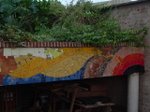 Imagem: do Blog de Passira News (link ao lado)
Imagem: do Blog de Passira News (link ao lado)Marta:
A propósito do encastelado Edmar, andei refletindo algumas linhas...
Bração
do
Guz
A propósito do encastelado Edmar, andei refletindo algumas linhas...
Bração
do
Guz
Paulo Cangussu
Guz escreve:
A notícia de que cientistas da Universidade de Zaragoza conseguiram clonar uma espécie extinta (há 9 anos!) de cabra montês, através de amostra de seu DNA recolhido na época, gerando um filhote que, no entanto, sobreviveu apenas 7 minutos, deixou-nos com uma pergunta na ponta da lingua: e o Brasil brasileiro e inzoneiro? Mas, segundo a revista The Economist desta semana, o Brasil não tem nenhum motivo de inveja diante dessa assombrosa experiência, pois na semana passada conseguimos (infelizmente, os responsáveis não eram cientistas) com sucesso clonar duas espécies extintas de dinossauros, que supúnhamos extintas há pelo menos vinte anos: Michel Temer e José Sarney. Com a copa do mundo ainda distante(1), nosso fervor patriótico foi aplacado com esta notável façanha pelos integrantes do Congresso Nacional, onde nós sabemos, a densidade de doutores é imensurável.
O artigo Onde os dinossauros ainda se movem pode ser lido abaixo, no original.E tem o subtítulo de Uma vitória do semi-feudalismo, referindo-se principalmente ao Maranhão, estado brasileiro dominado há 50 anos pela espécie Sarney , e por isso mesmo, um dos mais ricos sítios arqueológicos brasileiros, onde o atraso predomina de tal forma que lembra-nos das eras paleozoicas.(2)
Bração
do
Guz
(1) Além de dinossauros, é bom lembrar que viveu lá e cá a espécie da Preguiça Gigante. Contrariando o casal amigo Luiz & Rosana, que promovem o Saci como mascote ,fica aqui a sugestão para adotá-la como símbolo da Copa 2014.
(2) Está em estudos também a clonagem da espécie Collor, pela Comissão de Relações Exteriores do Senado. Para não falarmos da também notável façanha do deputado Edmar Moreira, que clonou um castelo medieval inteirinho em seu laboratório de São João Nepomuceno. Com 36 suites modernas equipadas com jacuzzis. Êta Minas!Ciência boa dimais da conta!
***********************************
A Brazilian political boss
Where dinosaurs still roam
Feb 5th 2009 SÃO LUÍS
A notícia de que cientistas da Universidade de Zaragoza conseguiram clonar uma espécie extinta (há 9 anos!) de cabra montês, através de amostra de seu DNA recolhido na época, gerando um filhote que, no entanto, sobreviveu apenas 7 minutos, deixou-nos com uma pergunta na ponta da lingua: e o Brasil brasileiro e inzoneiro? Mas, segundo a revista The Economist desta semana, o Brasil não tem nenhum motivo de inveja diante dessa assombrosa experiência, pois na semana passada conseguimos (infelizmente, os responsáveis não eram cientistas) com sucesso clonar duas espécies extintas de dinossauros, que supúnhamos extintas há pelo menos vinte anos: Michel Temer e José Sarney. Com a copa do mundo ainda distante(1), nosso fervor patriótico foi aplacado com esta notável façanha pelos integrantes do Congresso Nacional, onde nós sabemos, a densidade de doutores é imensurável.
O artigo Onde os dinossauros ainda se movem pode ser lido abaixo, no original.E tem o subtítulo de Uma vitória do semi-feudalismo, referindo-se principalmente ao Maranhão, estado brasileiro dominado há 50 anos pela espécie Sarney , e por isso mesmo, um dos mais ricos sítios arqueológicos brasileiros, onde o atraso predomina de tal forma que lembra-nos das eras paleozoicas.(2)
Bração
do
Guz
(1) Além de dinossauros, é bom lembrar que viveu lá e cá a espécie da Preguiça Gigante. Contrariando o casal amigo Luiz & Rosana, que promovem o Saci como mascote ,fica aqui a sugestão para adotá-la como símbolo da Copa 2014.
(2) Está em estudos também a clonagem da espécie Collor, pela Comissão de Relações Exteriores do Senado. Para não falarmos da também notável façanha do deputado Edmar Moreira, que clonou um castelo medieval inteirinho em seu laboratório de São João Nepomuceno. Com 36 suites modernas equipadas com jacuzzis. Êta Minas!Ciência boa dimais da conta!
***********************************
A Brazilian political boss
Where dinosaurs still roam
Feb 5th 2009 SÃO LUÍS
From The Economist print edition
A victory for semi-feudalism
JOSÉ SARNEY first ran for elected office over half a century ago. For the past 40 years he has controlled the fortunes of Maranhão, a state on the eastern fringe of Brazil's Amazon region. He has represented it as federal deputy (twice), governor, and senator (twice). In 1985 he became the accidental, and undistinguished, president of Brazil when the man chosen for the job died before he could take it up. More recently he has been senator for the nearby and newly-created state of Amapá (twice). Time to retire, one might think.
Mr Sarney may look like a throwback to an era of semi-feudal politics that still prevails in corners of Brazil and holds the rest of it back. But with the tacit support of Luiz Inácio Lula da Silva, the country's left-of-centre president, he was this week chosen to preside over the Senate. It is the third time in his career that he has held this powerful job, which confers a degree of control over the government's agenda and opportunities for patronage.
And so it will buttress Mr Sarney's grip over Maranhão just when some locals hoped that this was beginning to crack. The centre of São Luís, the state capital, is decrepit. Some historic buildings are well cared for, such as the gleaming white Church of Our Lady of the Exile. But most are slowly crumbling in the hot, wet weather. The streets are pitted with potholes. An extraordinarily large number of people hang around in the hope of getting a tip in return for showing drivers where to park. In a city of 1m people, there were 38 murders last month alone.
But it is outside São Luís where Maranhão's backwardness is most evident. In Sangue, a town in the interior, many people live in single-room houses, roofed with palm fronds, that lack both running water and electricity. Public transport is scarce. There is nothing much to buy or sell beyond bucketloads of bacuri, an Amazonian fruit. Educational achievement across the state is poor. Its infant mortality rate of 39 per thousand live births is 60% higher than the Brazilian average.
Reuters
********************A victory for semi-feudalism
JOSÉ SARNEY first ran for elected office over half a century ago. For the past 40 years he has controlled the fortunes of Maranhão, a state on the eastern fringe of Brazil's Amazon region. He has represented it as federal deputy (twice), governor, and senator (twice). In 1985 he became the accidental, and undistinguished, president of Brazil when the man chosen for the job died before he could take it up. More recently he has been senator for the nearby and newly-created state of Amapá (twice). Time to retire, one might think.
Mr Sarney may look like a throwback to an era of semi-feudal politics that still prevails in corners of Brazil and holds the rest of it back. But with the tacit support of Luiz Inácio Lula da Silva, the country's left-of-centre president, he was this week chosen to preside over the Senate. It is the third time in his career that he has held this powerful job, which confers a degree of control over the government's agenda and opportunities for patronage.
And so it will buttress Mr Sarney's grip over Maranhão just when some locals hoped that this was beginning to crack. The centre of São Luís, the state capital, is decrepit. Some historic buildings are well cared for, such as the gleaming white Church of Our Lady of the Exile. But most are slowly crumbling in the hot, wet weather. The streets are pitted with potholes. An extraordinarily large number of people hang around in the hope of getting a tip in return for showing drivers where to park. In a city of 1m people, there were 38 murders last month alone.
But it is outside São Luís where Maranhão's backwardness is most evident. In Sangue, a town in the interior, many people live in single-room houses, roofed with palm fronds, that lack both running water and electricity. Public transport is scarce. There is nothing much to buy or sell beyond bucketloads of bacuri, an Amazonian fruit. Educational achievement across the state is poor. Its infant mortality rate of 39 per thousand live births is 60% higher than the Brazilian average.
Reuters
Dominance by a single man or family was not uncommon in Brazil's north-east. But it is fading away. The Sarney clan is becoming unusual. Mr Sarney's daughter, Roseana, has been Maranhão's governor and currently represents it in the Senate. His son was a minister in Brazil's previous government. Other relatives are scattered in positions of authority in Maranhão's courts and the civil service. One of his lieutenants, Edison Lobão, is Lula's minister for mines and energy. When he took the job, Mr Lobão's seat in the national Senate went to his son; his wife sits in the lower house. All three of Maranhão's senators answer to Mr Sarney, as do his fellow senators from Amapá.
This control is aided by the Sarney family's ownership of Maranhão's biggest media company. Its television station transmits the programmes of Globo, which produces Brazil's most popular soap operas. These are interspersed with glowing news reports about the owner's family. Controlling television and radio stations is particularly useful in rural Maranhão, where a majority of the electorate is illiterate and where the Sarneys now draw most of their support. "We are ruled by an electronic oligarchy," laments Zé Reinaldo, a former state governor.
Even so, the family's power may finally be waning. In 2006 Roseana Sarney lost the gubernatorial election to Jackson Lago. But Mr Lago and his deputy are currently being investigated for electoral crimes. If they are impeached, Ms Sarney will take over as governor once again. In last year's municipal elections, Sarney candidates suffered some setbacks. "Sarney always says that Maranhão must vote for him so he can bring federal money from Brasília," says Arleth Santos Borges of the Federal University of Maranhão. "In fact he needs power in Brasília to shore up power here." That is what the Senate presidency brings him.
Meanwhile Maranhão continues in its sad way. "For fifteen years I have heard Sarney say he will bring development and tourism to Maranhão, but we still have one road in and one road out of this city," says Hélio, a waiter in São Luís. "And they are both a mess."
This control is aided by the Sarney family's ownership of Maranhão's biggest media company. Its television station transmits the programmes of Globo, which produces Brazil's most popular soap operas. These are interspersed with glowing news reports about the owner's family. Controlling television and radio stations is particularly useful in rural Maranhão, where a majority of the electorate is illiterate and where the Sarneys now draw most of their support. "We are ruled by an electronic oligarchy," laments Zé Reinaldo, a former state governor.
Even so, the family's power may finally be waning. In 2006 Roseana Sarney lost the gubernatorial election to Jackson Lago. But Mr Lago and his deputy are currently being investigated for electoral crimes. If they are impeached, Ms Sarney will take over as governor once again. In last year's municipal elections, Sarney candidates suffered some setbacks. "Sarney always says that Maranhão must vote for him so he can bring federal money from Brasília," says Arleth Santos Borges of the Federal University of Maranhão. "In fact he needs power in Brasília to shore up power here." That is what the Senate presidency brings him.
Meanwhile Maranhão continues in its sad way. "For fifteen years I have heard Sarney say he will bring development and tourism to Maranhão, but we still have one road in and one road out of this city," says Hélio, a waiter in São Luís. "And they are both a mess."





































































Um comentário:
Ri d+!!!
Info + Bom humor!
;)
KthY?
Postar um comentário